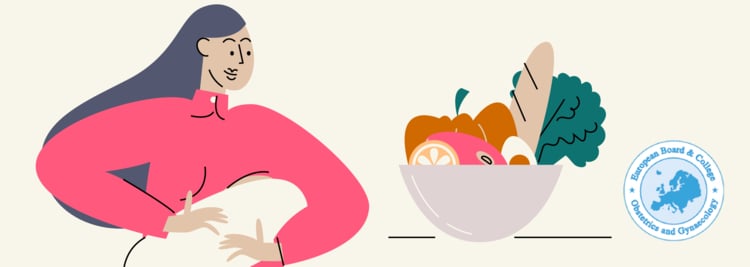The best breastfeeding diet is the one that contains all the essential nutrients and fiber. Read on to find out what these nutrients are, what foods to avoid while breastfeeding, and so much more.
-
Tracking cycle
-
Getting pregnant
-
Pregnancy
-
Help Center
-
Flo for Partners
-
Anonymous Mode
-
Flo app reviews
-
Flo Premium New
-
Secret Chats New
-
Symptom Checker New
-
Your cycle
-
Health 360°
-
Getting pregnant
-
Pregnancy
-
Being a mom
-
LGBTQ+
-
Quizzes
-
Ovulation calculator
-
hCG calculator
-
Pregnancy test calculator
-
Menstrual cycle calculator
-
Period calculator
-
Implantation calculator
-
Pregnancy weeks to months calculator
-
Pregnancy due date calculator
-
IVF and FET due date calculator
-
Due date calculator by ultrasound
-
Medical Affairs
-
Science & Research
-
Pass It On Project New
-
Privacy Portal
-
Press Center
-
Flo Accuracy
-
Careers
-
Contact Us
Healthy Breastfeeding Diet: What Foods to Eat While Breastfeeding


Every piece of content at Flo Health adheres to the highest editorial standards for language, style, and medical accuracy. To learn what we do to deliver the best health and lifestyle insights to you, check out our content review principles.
Milk production can burn up to 500 calories a day. While breast milk will meet your baby's nutritional needs regardless of what you eat, your own strength, stamina, and health will benefit from a healthy diet. You should also avoid starting a diet to lose weight while you're breastfeeding. A reduced-calorie diet during breastfeeding can lower your energy and milk supply.
How much water should a breastfeeding mom drink?
A breastfeeding mother needs more water to compensate for the fluid she loses from breastfeeding. You can drink water, juice, or other non-caffeinated, non-alcoholic beverages. It's best to drink frequently, preferably before you feel thirsty, and drink more if your urine appears dark yellow. Have a glass of water nearby when you breastfeed your baby.
Breastfeeding meal plan
A healthy breastfeeding diet means eating optimal amounts of a variety of foods that contain essential nutrients and fiber. You can mix it up from day to day for variety, but make sure you are getting the nutrients you need every day.
- Protein (lean meat, chicken, fish, eggs, dairy products, legumes, nuts, and seeds) — 3 servings per day
- Calcium (dairy products, tofu, dried fruit, spinach, and legumes) — 5 servings per day (If your diet has less than 3 servings per day, you should also take a calcium supplement with vitamin D.)
- Iron-rich foods (beef and chicken liver, oysters, tuna, tofu, lentils, spinach) — 1 or more servings per day
- Foods rich in vitamin C (guava, sweet pepper, oranges, strawberries, papaya, broccoli) — 2 servings per day
- Green leafy vegetables and yellow fruits — 3–4 servings per day
- Other fruits and vegetables — 1 or more servings per day
- Whole-grain foods and other complex carbohydrates — 3 or more servings per day
- Small amounts of healthy fats such as canola oil, olive oil, and fatty fish as well as avocados, olives, nuts, and seeds
- Omega-3s & DHA-rich foods to promote baby's brain growth — 8 to 12 ounces of low-mercury fish and seafood, such as salmon, shrimp, light tuna, tilapia, catfish, crab, and scallops. (You can also get omega-3s from DHA-enriched eggs, seaweed, and chia seeds.)
Are there any foods to avoid while breastfeeding?
While you can find many lists of foods to avoid while breastfeeding on the internet, the truth is you can eat almost any foods as long as they are nutritious, and both you and your baby can tolerate them.
The only exemption might be fish with high levels of mercury, like shark, tilefish, mackerel, and solid white or albacore tuna. It's best to limit the consumption of this kind of fish because mercury can affect the infant's nervous system.
Supplements for breastfeeding mothers
The World Health Organization recommends that mothers with specific micronutrient deficiencies take supplements to support their health and the health of their infant. But even if you don't have any vitamin or mineral deficiency, you may choose to supplement your diet.
Health professionals advise all pregnant and breastfeeding mothers to take 400 units of vitamin D daily. The same supplements are recommended for infants starting at 6 months of age. Children born with a low birth weight may be recommended vitamin D supplementation even before 6 months.
Breastfeeding diet for vegetarians and vegans

Vegans generally need to take vitamin B12 and vitamin D supplements. These micronutrients are difficult or impossible to get from plants, so they should be supplemented. Vitamin B12 can also be found in fortified cereals and yeast extracts. All other vitamins and minerals can be found in vegan foods.
Calcium levels decrease during lactation and need to be maintained. Calcium can be derived from green leafy vegetables, almonds, brazil nuts, sesame seeds or tahini, fortified soy milk, tofu, and bread.
Vegetarian and vegan women are at higher risk of iron deficiency. Iron can be sourced from dark green vegetables, legumes, bread, dried fruits (such as apricots), eggs, fortified cereals, and plain chocolate.
Protein alternatives are found in whole grain bread, legumes (baked beans, lentils, chickpeas), seeds, potatoes, and nuts.
Foods to avoid while breastfeeding
In general, there're no foods a breastfeeding mom must absolutely avoid. But it's best to limit your alcohol and caffeine intake.
Alcohol passes into and back out of breast milk at about the same rate it enters and leaves your bloodstream. There's no level of alcohol in breast milk that's considered safe for a baby. That's why it's best to cut down on alcoholic beverages while breastfeeding or pumping milk.
An occasional alcoholic beverage or two is not contraindicated if you make sure that your baby won't be affected. If you drink, avoid breastfeeding until the alcohol has completely cleared your breast milk. This typically takes two to three hours for 12 ounces (355 milliliters) of 5 percent beer, 5 ounces (148 milliliters) of 11 percent wine or 1.5 ounces (44 milliliters) of 40 percent liquor, depending on your body weight. Pumping and dumping doesn't speed the elimination of alcohol from your body.
As for caffeine, it's fine to have 1–2 cups a day. But larger amounts of caffeine can affect your baby's sleep.
Breastfeeding diet: the bottom line
Your breast milk is an important source of nutrition for your baby. By eating a variety of foods rich in essential nutrients and drinking plenty of water, you ensure that both of you get everything you need to stay healthy.
Extensive research has found no foods that mothers should absolutely avoid during reastfeeding. But if your baby reacts negatively to a particular kind of food, you can replace it with an equally nutritional alternative.
Content created in association with EBCOG, the European Board & College of Obstetrics and Gynaecology.
Take a quiz
Find out what you can do with our Health Assistant


Hey, I'm Anique
I started using Flo app to track my period and ovulation because we wanted to have a baby.


The Flo app helped me learn about my body and spot ovulation signs during our conception journey.


I vividly
remember the day
that we switched
Flo into
Pregnancy Mode — it was
such a special
moment.
Real stories, real results
Learn how the Flo app became an amazing cheerleader for us on our conception journey.




